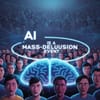The rapid advancement of artificial intelligence is creating a sense of unease and disorientation in society. The impact of AI is not just about job displacement or productivity but has deeper psychological and societal implications. AI-generated content, such as chatbots and virtual influencers, is blurring the lines between reality and fantasy. A recent example that highlights this unsettling trend is a former cable news anchor interviewing a dead teenager reanimated by generative AI.
People are becoming increasingly dependent on AI tools, leading to emotional collapse and mental health spirals. Some individuals have developed delusions, such as believing they're being watched by the FBI or have special powers. The proliferation of AI-generated content and the echo chambers of social media are fueling this sense of mass delusion, where people are losing touch with reality and becoming more polarized.
Many people are uncertain about the future and fear that AI will disrupt their lives. This anxiety is exacerbated by the hype surrounding AI and the lack of understanding about its implications. It's crucial that we take a step back and reassess our relationship with AI, considering the potential consequences of our actions and ensuring that we're not creating a dystopian future.
The need for perspective and responsible development is paramount. As AI continues to evolve, prioritizing transparency, accountability, and a nuanced discussion about its implications is essential to mitigate its potential risks and ensure a future where AI benefits society as a whole.


